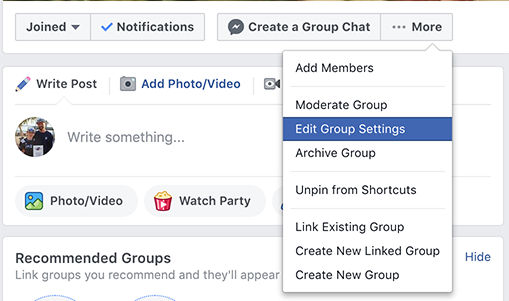Did you miss it? In a change that could have a signficant impact, Pages can now join Facebook groups. If you are a group moderator, you should think about whether you want this to be the new normal.
Let’s take a closer look at the announcement, what it means for your Facebook groups, and what you can do about it.
The Announcement
On February 7, Facebook wrote an announcement about changes coming to messaging and groups for businesses. The big change is this one for groups:
…in the coming weeks, Pages will be able to participate in Facebook Groups and join community discussions in a way that is representative of their business or organization.
Note that Pages have been able to create and link groups for a while now. As a group creator, the admin has the option of interacting in the group as a person or as the Page. But until now, other Pages couldn’t join the group.
Facebook provides the following use case from Claire Lee of Venue Queen Ltd. to provide support for this update:
By joining group discussions using my Page identity, I’ve been able raise [sic] the profile of my business. In fact, since switching over from my personal profile to my business Page in the groups I network with, I have seen members from these groups follow me or send messages to my Page Inbox. It’s great because these interactions can eventually lead them to consider me for future opportunities.
Sounds good for the brand. But…
Do You Want Pages in Your Group?
The example above provides evidence for why I do not want Pages in my groups. The argument for interacting in a group as a page is entirely self-promotional.
Now, there may be times when this makes sense. Maybe the entire purpose of your group is focused on promoting and supporting local businesses. But the opportunity for abuse is huge.
Groups are most effective for person-to-person discussion. That’s what makes them interesting and different in the first place. People don’t hide beneath brands and logos. There’s more accountability that way.
I have private communities built around Facebook groups. The entire purpose is to help one another, and we have strict rules that these communities are not places for self-promotion.
I always think about ways that bad actors can abuse a new feature. I fully expect pages — eager to improve their following and organic reach — to begin joining as many groups as they can as a way to promote their businesses.
More spam is coming. More low-quality group content is coming. It’s easy to predict.
What You Can Do About It
As it currently stands, an influx of pages and low-quality content in groups is inevitable because the admission of pages in groups is a default. However, groups do have the ability to turn this off.
First, go to your Group Settings.

Down the page, you should see a section for “Membership Requests from Pages.”

In the example above, the default is set to “Allow Pages to request to join as group members.” I don’t want that! Instead, you can simply select the option to disallow new requests from Pages and save the setting. If you’ve already let some Pages in (if you use automatic approval, for example), you may need to go in one-by-one and handle that.
As I type this, I have the “Membership Requests from Pages” section in the Group Settings of two of my three Power Hitters Club private Facebook groups. If you don’t yet have it, I assume that Pages can’t yet join your group.
Why is Facebook Doing This?
I have a hard time understanding this move. In the face of misinformation, spam, inauthentic behavior, and fake accounts, Facebook should be focused on quality. The user experience should always come first, even at the expense of business.
That’s not what appears to be happening here. The thought process behind allowing Pages into groups is focused on improving results for businesses. This will be at the expense of inauthentic, impersonal, and spammy behavior. We, as users and group admins, did not need more of that.
Business owners may see this as a win, but it’s a short-sighted win. While it will be a loophole to get your business seen at a higher rate, many will abuse this. As a result, the quality of posts within groups and the usefulness of groups generally will decrease.
Unless, of course, Facebook does something about it. One step is simple: Turn this off by default.
Your Turn
What do you think about this update? Will you allow Pages into your groups?
Let me know in the comments below!







